Our newest CALI Award winner is Nicky Mih, who is fighting child sex slavery in Cambodia, through her scholarship program. Free To Shine was founded in June 2010, after Nicky spent a month with more than 200 survivors of child sex slavery.
The approach and philosophy was not to rescue or fix, but to empower through education. They wanted survivors to be able to attend university, and they wanted every young girl to be protected from the horrors of being trafficked.
Three years on, and Free To Shine now have 105 girls on their scholarship program, as well as 2 survivors. Free To Shine have created a dynamic, professional organisation with growing support from passionate volunteers, sponsors and investors, enabling them to grow and reach more and more girls.
Q: Tell us about Free To Shine.
Free To Shine believes that no child should be in a brothel. We believe every girl should be in school gaining an education, so she has choices and opportunities in her life.
We go out into the rural communities of Cambodia and we find those girls most likely to be targeted by traffickers, and enrol them in our scholarship program instead. This means we fund their enrolment fees, photocopies and handouts, exam fees, we provide school uniforms, shoes and bag, books and other educational resources, as well as a bicycle so they can reach school.
Our girls each have a case worker who visits the family to provide ongoing support and education, as well. This is a key part of keeping them in school, and keeping them safe.

.
The villages our girls live in, are among some of the poorest. Most of the girls and their families live in small houses made of woven palm leaves. Some of the families own a plot of land on which they grow rice or vegetables. Others don’t own any land and have nowhere they can grow crops.
Mains electricity has not yet reached these communities. Some still pump water from wells, while others collect water from the dirty river. A few have water filters which ensure safe drinking water, but most don’t. Most families do not have toilets.
The range of work our children have been involved in, varies, from growing vegetables and harvesting rice, picking lotus pods out of the pond, looking after nieces and nephews to enable their older siblings to work – weaving baskets, collecting plastic to sell and even working in factories.
Several of the girls in our program have either one or both parents who have died or left them, are abusive, alcoholic, have HIV/AIDs or have been sex workers. Several of the girls have suffered physical abuse like being bitten, having food withheld as a punishment, being hit and beaten, to being put in a sack and thrown in a pond. Several of the girls have also been raped.
While most of the girls remain with family members in their communities, those girls who were living in highly neglectful or abusive environments, now access our scholarship program from the safety of a child protection centre.
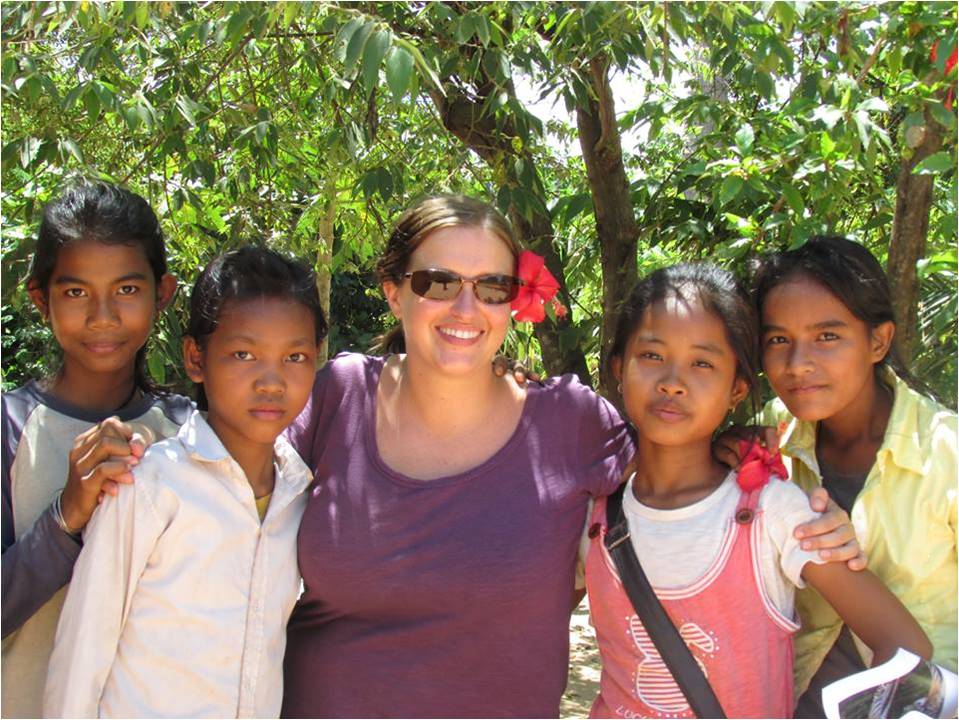
.
Now the girls are thriving in school. They are enjoying their library books. Some are also attending additional classes in English, computers, traditional Khmer dancing, art and craft, hospitality and sewing. Their case worker teaches them the importance of education, that a university education is possible, and several of our girls have dreams to become teachers, doctors, nurses and accountants!
Q: What inspired you to set up Free To Shine?
Four years ago I read Somaly Mam’s book, ‘The Road of Lost Innocence’ about how she was sold to a brothel while she was still a child. Edmund Burke’s quote has always stuck with me, “all that is necessary for evil to prevail, is for good men to do nothing”.
When I thought of it like this, that these girls are being tortured with acid, electrocuted and raped up to 30 times a day because you and I are doing nothing to stop it, I knew it was time for us to step up.
I booked a flight to Cambodia and went to spend a month with more than 200 survivors. I saw terror in the eyes of girls who had just been rescued. I met survivors who were rebuilding their lives and reintegrating back into their communities, others who had been tortured, and girls who had been sold by their parents when they were just 7, who were now helping other survivors.
I met a survivor who was only 6 years old – she had been sold when she was 4 years old! It changed me. It taught me that you can love in an instant. It taught me what real strength was, and it taught me to spend my time doing something that really mattered.
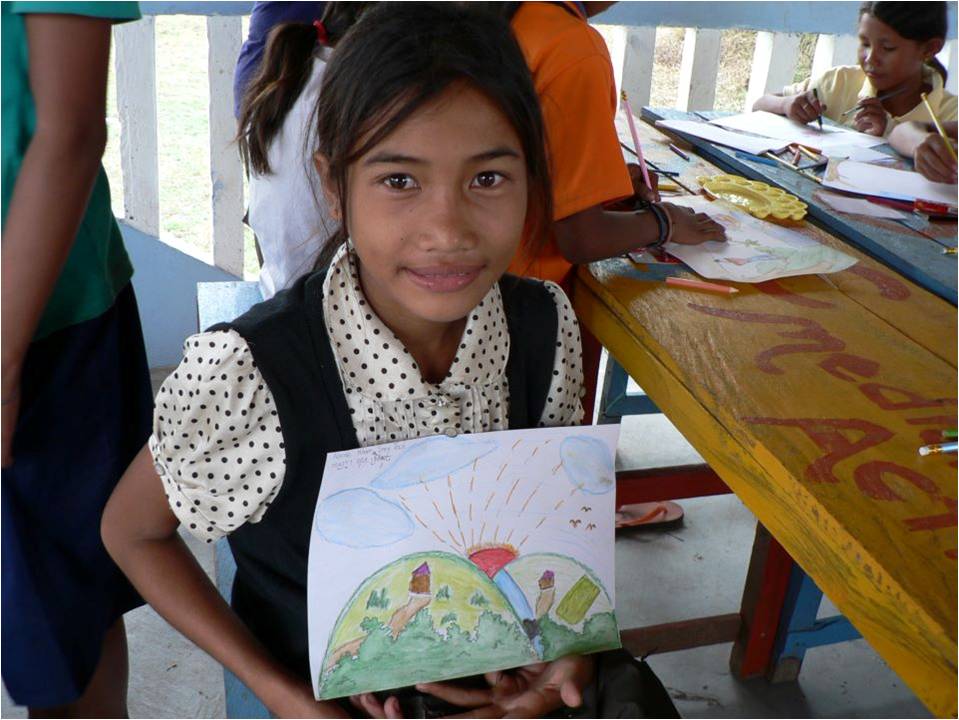
.
I asked these survivors how I could help, and what they wanted. They wanted to end sex slavery. They wanted for girls to be able to attend university so they could become teachers, doctors and lawyers, as they viewed these professions as being fundamental in ending sex slavery.
They knew that many girls don’t get to go to school because teachers charge them to attend, whereas if they were teachers, no matter how little their government salary was, they would never charge a student as they knew the importance of the girls being safely in school.
They remembered times in captivity where they’d received a beating so severe they had been taken to the hospital. Nobody had seen that they needed help.
They knew that if they became doctors and nurses, they would spot a girl in need and not send her away with the pimp, after patching her up. And they wanted for survivors to become lawyers, so they could prosecute the brothel owners and the traffickers.
They also explained that when girls are rescued from the brothels, the brothel owners do not go without girls. They simply go out into the rural villages and take a new young girl. They wanted these girls to be protected. They believed that if these young girls were in school they would not be trafficked.
Investing in a girl’s education means she is no longer just another mouth for her parents to feed, but someone who will be able to get a job in the future and support her family. So I had to figure out how to get into these villages, identify which girls were most at risk, how to get them in school and to keep them there.
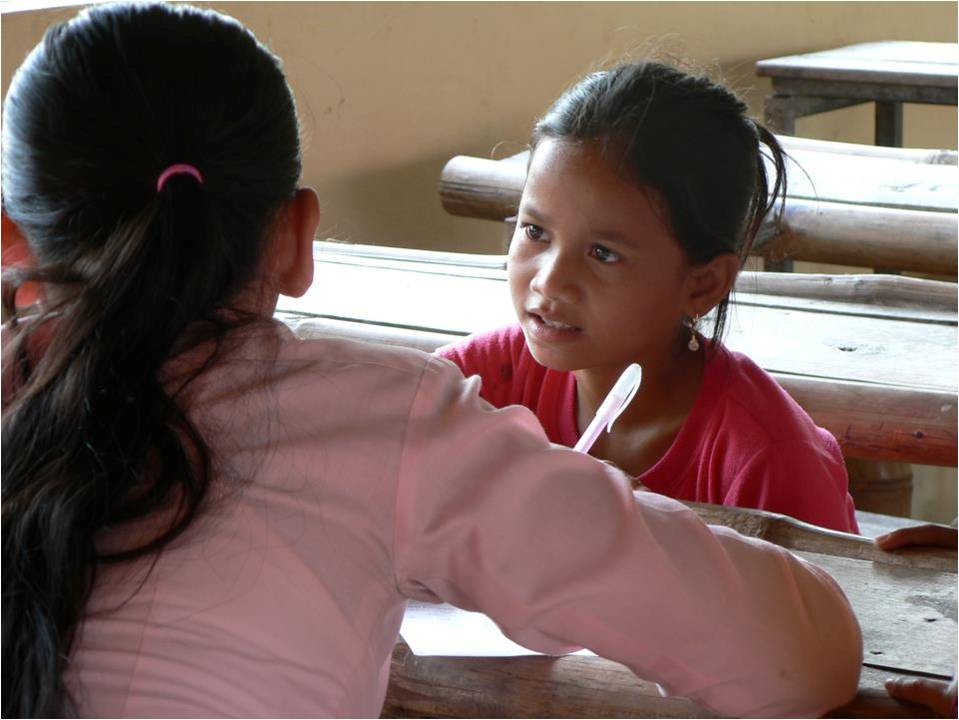
Q: How big is the problem with sex-slavery? What is the solution as you see it?
Whenever there is a child being sold for sex, we have a BIG problem. The International Labour Organisation conservatively estimates that there are currently 945,000 children in sexual slavery, with 56% in the Asia Pacific region.
Educated girls don’t get sold. Of the 200 survivors I spent time with, most hadn’t completed primary school. These girls had parents who had never been to school. Yet when educated girls grow up and become mothers themselves, they put all of their children, both boys AND girls, in school. They are able to feed their children. If they are educated, the ploys of a trafficker wouldn’t work on them.
When girls complete high school, they are not in the same situation of poverty, that their parents currently face – they have opportunities.
Q: What do you predict for the future of these girls?
I predict they will be leaders. They will be leaders within their families, and leaders of their communities. Free To Shine wasn’t set up to ‘fix’ Cambodia, but to empower girls who are survivors of sex slavery and those girls at risk, to be the change they want to see in their own communities and country.
Our girls are already becoming leaders by working together to improve the home and living conditions of each scholarship student. They go first to one girls house to sweep and tidy, create rubbish bins, repair holes in the roofs and walls of houses, build fences and plant vegetable gardens. They then move onto the next girls house.
Other members of their community see what they are doing and follow suit – in this way they’re already leading their own communities!
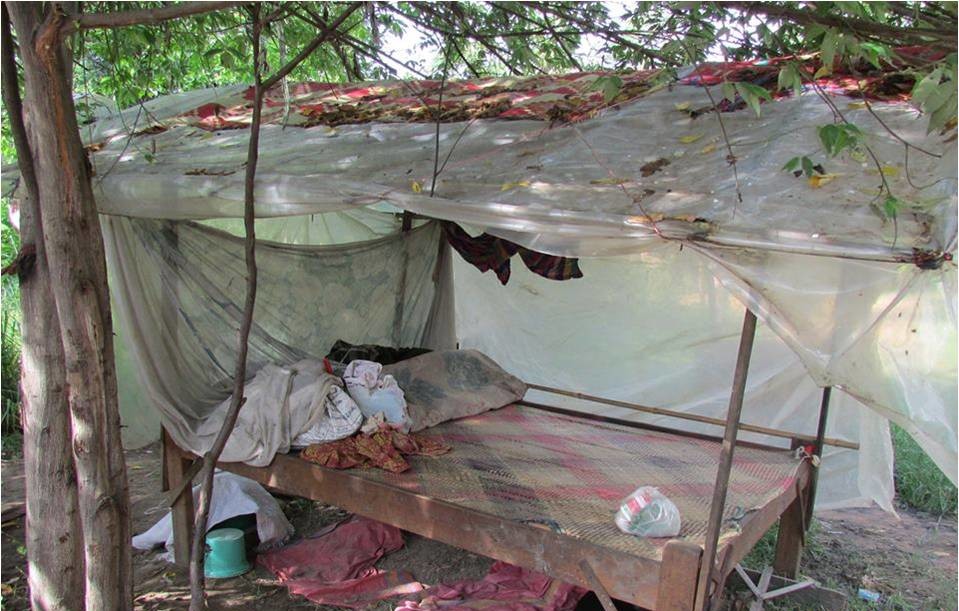
Q: What is something you are really proud of?
We’re proud of our girls in so many ways. We’re proud of 11 year old Keeth who knew the mobile library was coming to change her book for her. She knew she’d get a new one, but she also knew she’d be giving the old one back. So when our Education Outreach Officers arrived, she proudly showed them how she has copied the entire story into the journal we gave her, “so I’ll always have the story”.
We’re proud of Bona who is in Grade 7 and comes top of her class. We’re proud of 11yo Sreynoy who borrows a phone from someone in the village to call our Education Outreach Officers, just to practise her English with them.
We’re proud of Roathana, in Grade 9, who was selected as the only student from her entire high school of 1,500 students, to sit an exam to discover the best maths student in the entire province. She now wants to be an accountant.
We are proud of Ampo who is studying hard in Grade 10, and volunteers on a Sunday as a trainee case worker, visiting 30 families in her community to teach about the importance of education, health, hygiene and budgeting.
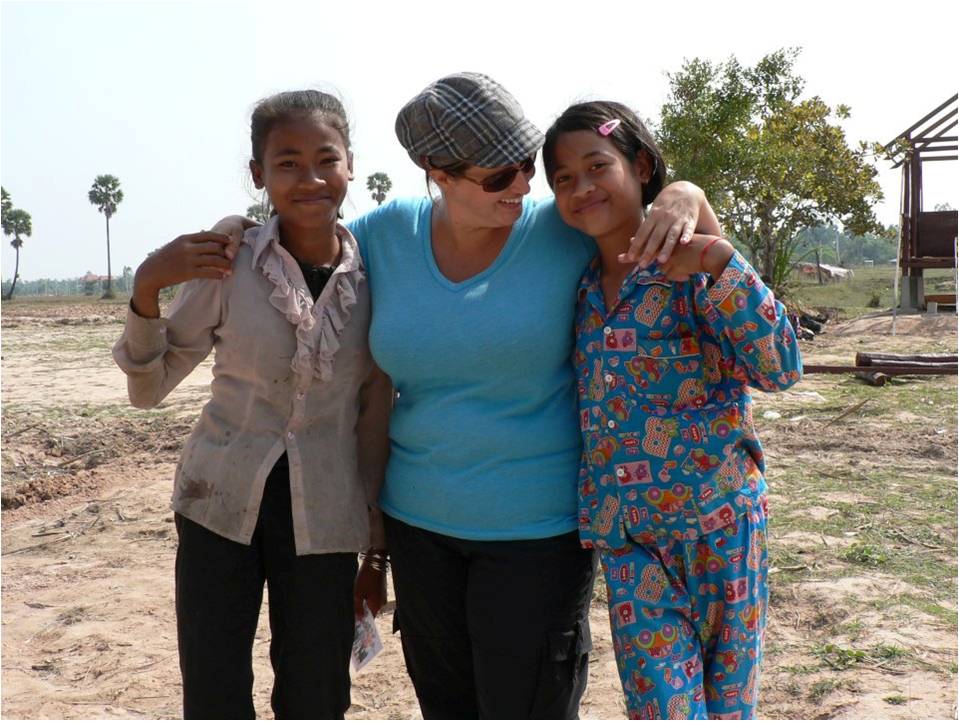
Q: What drives you?
It should be the right of every child to go to school. No child should go to a brothel! It’s that simple. I spent time with the girls who went to brothels instead of school. What drives me, is the girls.
They need someone to stand in their village and say “No, you won’t take these girls to brothels. They will stay here and go to school. They will get to read books. They will get to smile. And they will get the opportunity to shine”.
They will lead their communities and country. We must simply protect them long enough to ensure that they get that chance.
Q: Do you feel there is reward in your efforts?
Yes, I absolutely do. Every time we read a heartbreaking application form and enrol another girl on our program, we get to know that she will go to school and not a brothel. Every time we see a young girl enjoying one of our library books we feel blessed to have brought her this opportunity.
Every time we see a mother look at her daughter with pride and joy as she studies or reads a book, knowing she will never have to look a trafficker in the eye with absolute desperation, as she permits her daughter to go with him, is a reward. Every smile we see in these girls is a reward. Every good grade a girl gets in school is a reward.
Every fun event run by our team here in Australia is a reward, and we can see it in the joy experienced by those who attend. Every new sponsor that joins us is a reward. Every look of pride in our team, in Cambodia is a reward. We are most blessed. We get to live a life of purpose, knowing our time is well spent. We know we’re making a difference.
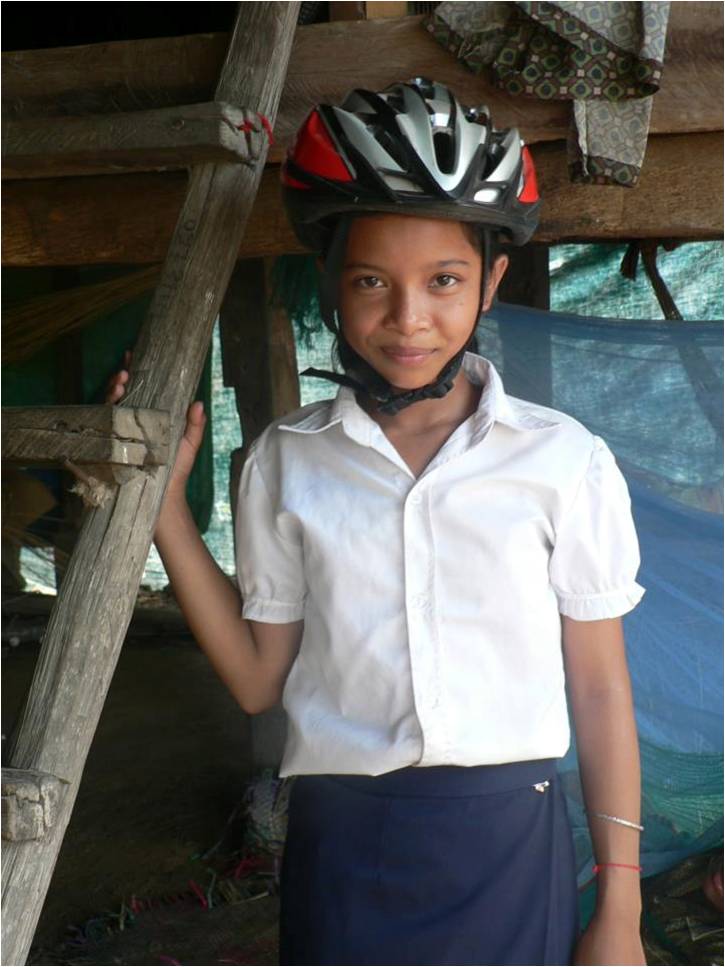
Q: If you had your way, everyone in the world would spend 5 minutes a day…
Doing SOMETHING to stop child sex slavery – either 5 minutes a day volunteering, organising an event to raise funds and awareness or making money to donate. I think everyone should spend 5 minutes a day doing something towards creating a world where no girl is in a brothel, a world where every girl is in school and shining.
Connect with Nicky:
Want more inspiration?
- FEATURE VIDEO: Community Project that Saves Turtles using Plastic Bags from Beaches
- Read more inspiring CALI award interviews!
- Volunteering overseas? How to plan your volunteer experience
- Frank Weijand – Winner of the CALI Award - January 1, 2019
- Camilo Buitrago Hernandez – Winner of the CALI Award - July 13, 2015
- Jay Jaboneta – Winner of the CALI Award - July 6, 2015